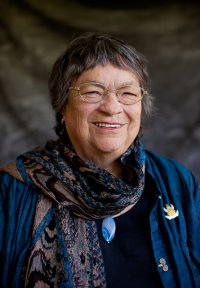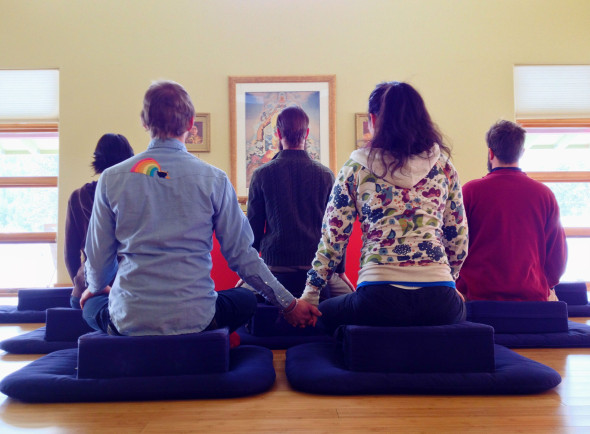Love it or lump it, it’s February and Valentine’s Day is approaching. Nevermind the consumerism, let’s get to the heart of the holiday—love. In Buddhism, the word love is deeply nuanced and embraces the totality of our experience—both the joy and the tears. In the teachings on loving-kindness, it is unconditional and extended to everyone, including ourselves. We interviewed Acharya Allyn Lyon, a senior teacher in the Shambhala Buddhist tradition, about the complex relationship between loving-kindness and romantic love.
What is loving-kindness?
Loving-kindness is fundamentally letting people be who they are and being interested in who they are. It also includes wishing others well. Wishing that all beings could be happy, that they could be free from suffering and that they realize their basic goodness. You start with a wish and an intention. Then you do what you can to be helpful.
How does romantic love tie in with loving-kindness?
Romantic love is always a challenge because it often begins with infatuation. Infatuation is not seeing others as they are. You leave out a lot. You see the part of them you really like and you can ignore very skillfully the parts that will become irritating to you in the long run. So infatuation is always dangerous and frequently short-lived because you can only ignore things for so long. This doesn’t mean you can’t be touched by people. You can really appreciate them. You can love them. But it’s important to love who’s really there, rather than your edited version of who’s really there.
How can we practice loving-kindness in our relationships?
You start with just appreciating people for being who they are. This is done primarily by learning to listen and using all of your sense perceptions. You let them tell you about themselves, rather than working with our projections on how we think they ought to be. What we think is going on, whether we are right or wrong, is still our projection. So you find out from them what’s happening. Be aware of body language. You then create a lot of space for them to be who they are.
What’s another good way to find out who someone really is?
Be together at a dharma center. (laughs)
[Note: Shambhala Mountain Center is currently accepting job applications]
How do you practice loving-kindness when a relationship ends?
What I discovered was that when every passionate relationship ended–whether it was one way or two way–we were usually still friends. It does not have to end by being angry, disappointed or hurt. You can appreciate the whole process and you can be friends. Or you may discover you really don’t like them. Then you can learn a lesson about how blinding infatuation can be, because the person you fell in love with and the person who is really there had nothing to do with each other.
How can we use relationships in our practice?
You try the romantic thing enough times and you suffer enough disappointment that you begin to appreciate that it isn’t what you think it is. Then you can certainly have a partner. It’s great for Mahayana practice, it really is. But you really have to make friends with the person that you’re with. Really be friends and not have some glowy illusion about how it’s supposed to be.
We have preconditioned attitudes about what relationships are. All of these ideas are culturally conditioned whether it’s by Hollywood, our parents, our schools, or our churches. But rarely are relationships like that. That is actually the process of getting into your conceptual mind and exposing these preconceived ideas about how things should be or how things are and discovering that they’re not. The path gives you the opportunity to do that, but you are bound to not like everything you discover. After awhile it gets funny and it’s not so bad.
What is the best way to experience love?
Be touched by the suffering of others and be touched by the happiness of others without being envious or jealous. It all has to do with allowing yourself to be touched. Joy is part of that, as well as sadness.



A related article on meditation and love
http://news.yale.edu/2014/02/11/meditation-helps-pinpoint-neurological-differences-between-two-types-love
I see a lot of interesting content on your
blog. You have to spend a lot of time writing, i know how to save you a lot of time, there is a tool that creates unique,
google friendly posts in couple of minutes, just type in google – laranita’s free content source
I read a lot of interesting posts here. Probably you
spend a lot of time writing, i know how to save you a lot of
time, there is an online tool that creates readable, SEO friendly posts in minutes,
just type in google – laranitas free content source